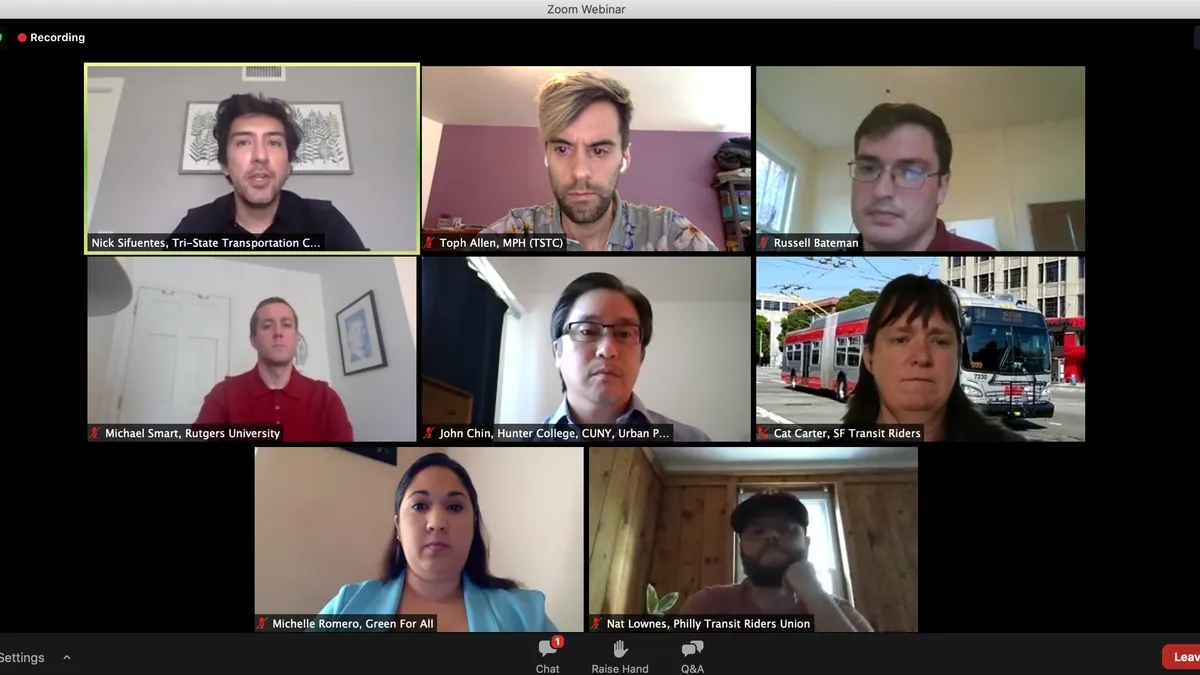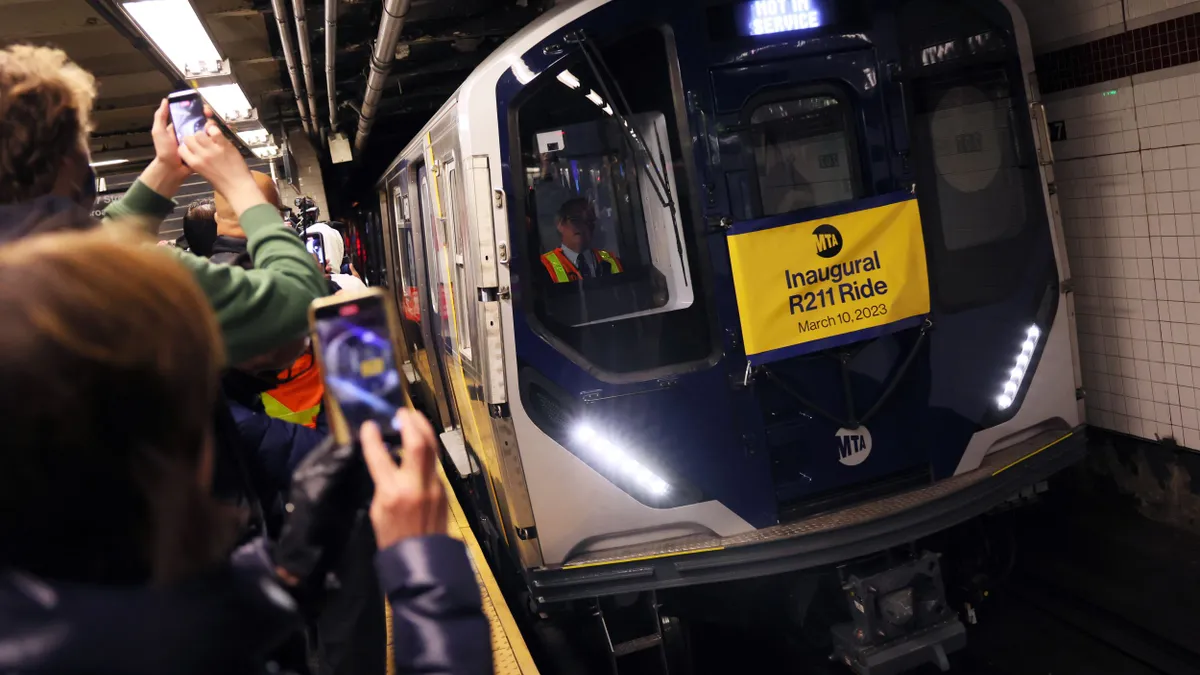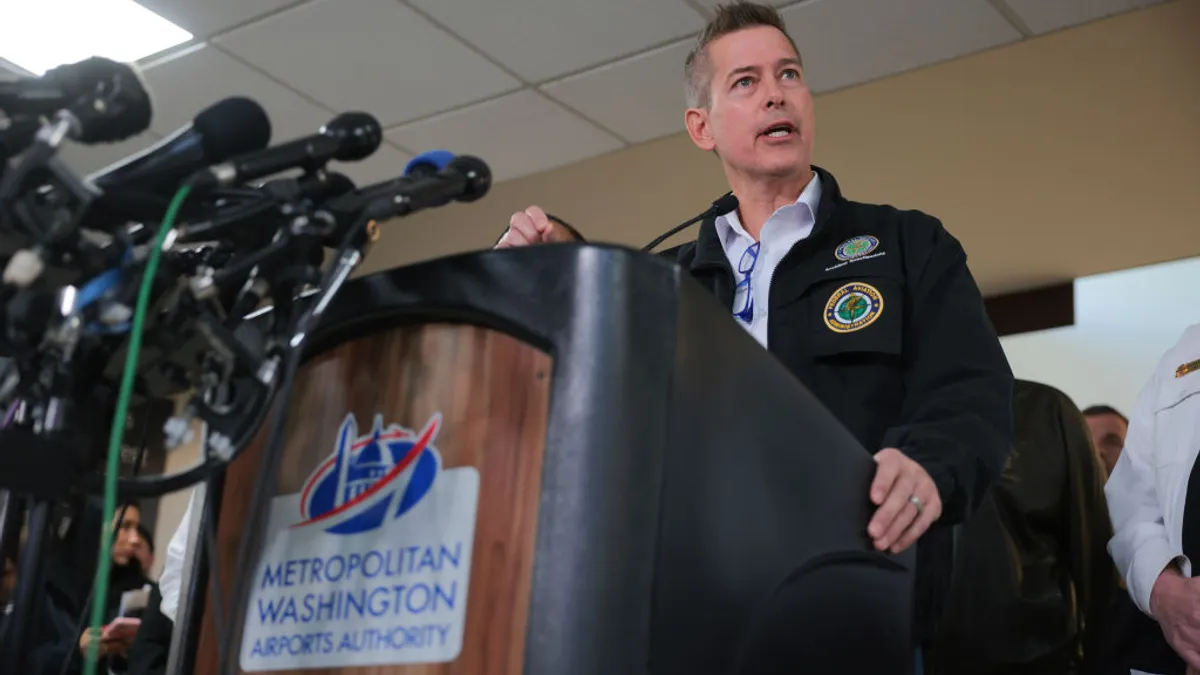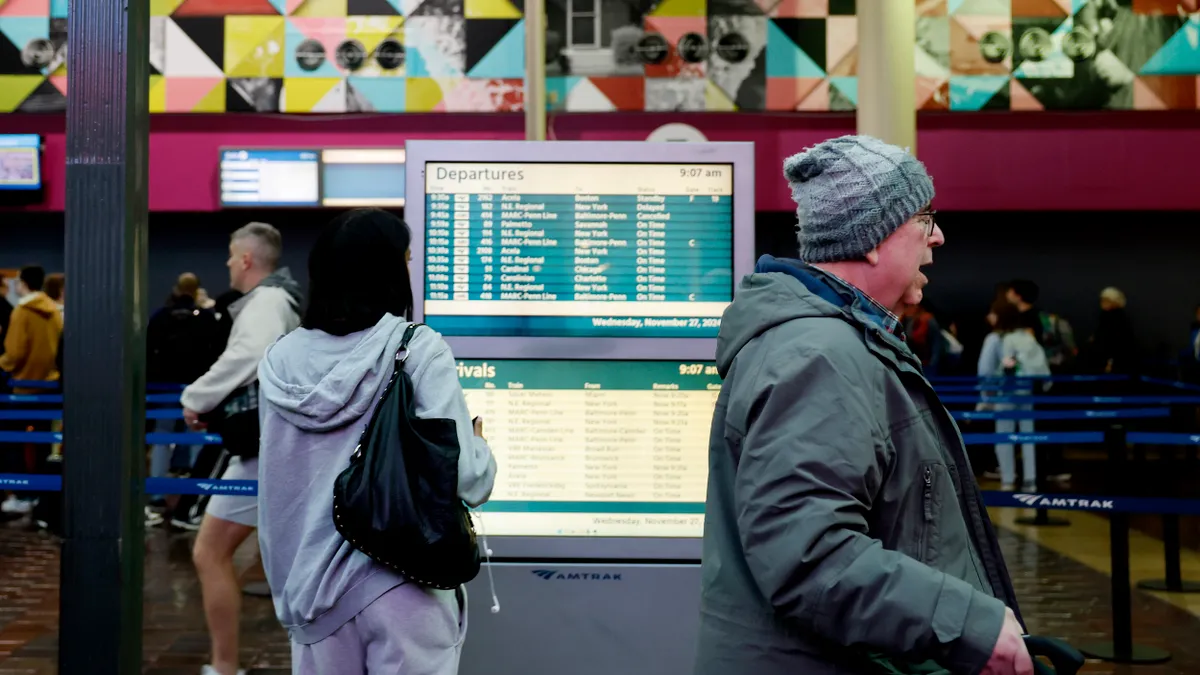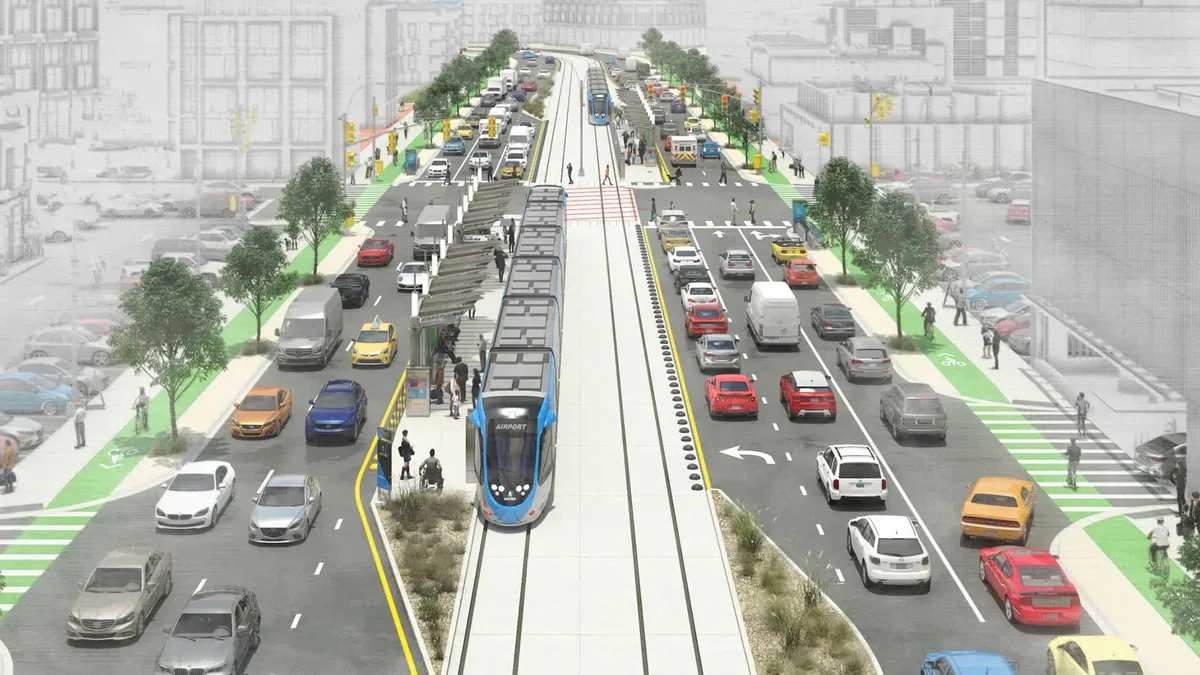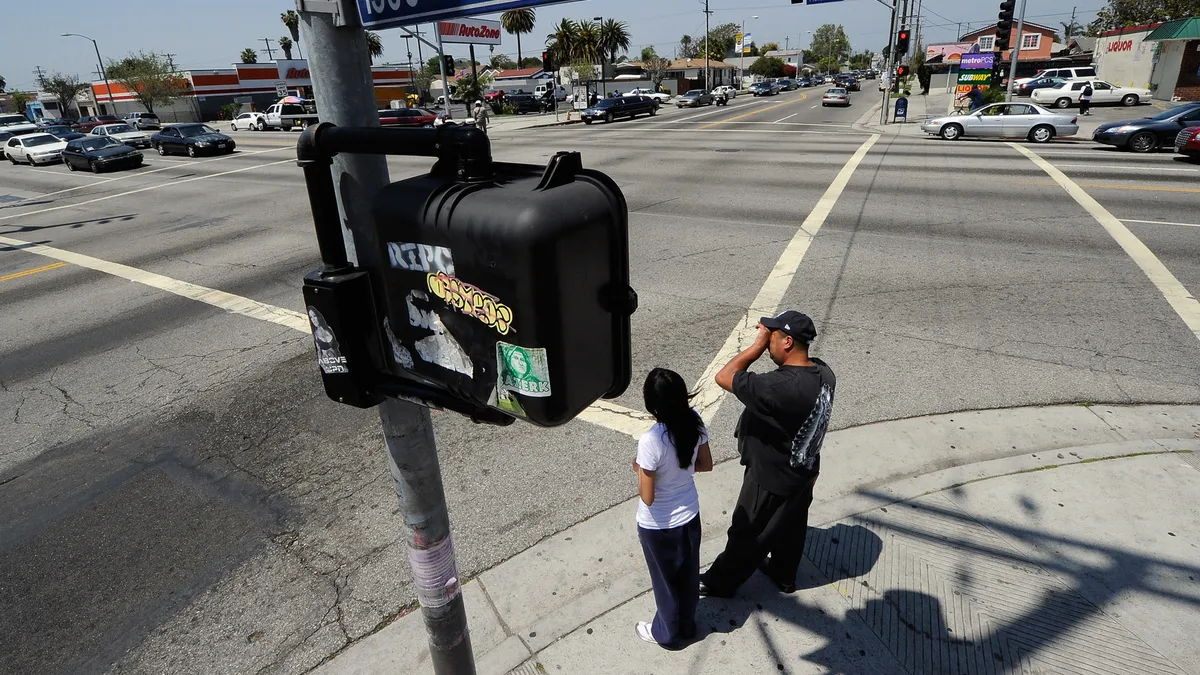A group of speakers including transit advocates, public health scientists and transit justice leaders gathered on a virtual conference call Wednesday to discuss how transit agencies can effectively rebuild ridership amid cities' COVID-19 recovery.
The discussion followed the release of two separate reports exploring the immediate and long-term changes transit agencies can make to prioritize safety, health and equity when resuming services: "Back on Board: A Guide to Safe(r) Transit in the Era of COVID-19," released by the Tri-State Transportation Campaign, and "Securing Safe Transit: Before and After COVID-19," released by social justice group Green For All.
"Transit in the United States should, and must, change forever," said Nick Sifuentes, executive director of the Tri-State Transportation Campaign, at the beginning of the call. "This pandemic is a public health crisis that demands a shared, public solution."
However, fears of density and inconsistent guidance from varying levels of government — on top of "painful" financial ruin in major U.S. cities — and have combined to create a messy recovery process. Green For All National Director Michelle Romero said on the call that the new reports address these challenges by asking policy makers to think more holistically (and scientifically) about recovery measures.
"The decisions that our policy makers and transit agencies make in response to COVID-19 will have ripple effects and consequences for addressing each of those other issues," she said.
Report recommendations
The findings in the Campaign's "Back on Board" report were largely based on an open-ended survey conducted in April and May of more than 1,000 regular transit users. While 8% of respondents said they would only feel safe on transit after receiving a vaccine — or that they do not plan to return to transit at all — 92% of respondents offered policy suggestions that they believe would make transit safer and healthier amid returning.
Respondent called for increased cleaning, mask requirements, increased social distancing and more service capacity. The Campaign combined these suggestions with scientific research, expert guidance and current health findings to develop a list of 53 recommendations for transit agencies across six key categories: health & prevention, sanitation, operations, partnerships & planning, infrastructure & technology and communications.
Epidemiologist Toph Allen consulted with the Campaign to develop the recommendations and ensure health risks are appropriately addressed. Allen said on the call that source control and good ventilation are keys to successful COVID-19 response, and solutions like "quiet car" implementation on trains should be considered to minimize possible transmission.
Meanwhile, Green For All's report provided a more narrow analysis of transit practices in Illinois, California and Massachusetts — three of the five states with the highest number of COVID-19 cases, as of May 14 — as well as insights from transit groups serving vulnerable populations in 11 states. The analysis and interviews resulted in nearly two dozen policy recommendations for transit agencies, federal agencies and Congress to consider in building a more equitable system amid recovery — some of which oppose current recommendations.
Romero said wavering recovery guidance has created obstacles for vulnerable populations, and argued that some groups may be disproportionately impacted when transit agencies implement solutions like service reduction or mask requirements.
"The main point here is that the COVID-19 health crisis is not the only crisis that we’re facing, and we need our decision makers to keep that in focus," she said on the call. "We’re facing a worsening economic crisis, an ongoing crisis of racial and economic injustice, as well as a climate crisis."
Battling fears and nuance
Speakers agreed on the call that fear is a main challenge in transit recovery, particularly in respect to density and crowding. Sifuentes pointed to European hubs like Vienna, Tokyo and Paris that have managed to regain high levels of ridership while avoiding COVID-19, illustrating that cities can squash social fears without risking public health.
John Chin, professor of urban planning & policy at Hunter College, said on the call that Americans have a "baked-in, societal bias against density" that must be addressed to maintain the viability of public transit.
"These reports … serve as a badly needed corrective to the automatic, unthinking fear of density, fear of cities, and fear of public transit," Chin said. "Many people take it as a foregone conclusion that density is dangerous and public transit will therefore be dangerous. We’ve seen that belief reflected in media headlines and guidelines for reopening, that have uncritically assumed the dangers of density and public transit."
Chin went on to say that such a bias is "rooted in our urban history," however evidence has shown that it is possible to manage the pandemic well in high-density areas, and that low-density regions are not necessarily safer.
"These reports … serve as a badly needed corrective to the automatic, unthinking fear of density, fear of cities, and fear of public transit."

John Chin
Professor of urban planning & policy, Hunter College
"Density is one of the key ingredients that makes our cities successful," Chin said, noting that returning to "normal" will require new safety measures —supported by all levels of government — that prevent riders from surrendering public transit in favor of single-occupancy vehicles.
San Francisco Transit Riders Executive Director Cat Carter expressed concern regarding this lack of consistent governmental support, suggesting that so much policy nuance and uncertainty is keeping transit riders from getting back on board.
Carter went on to explain that San Francisco currently requires face masks on transit, however the state of California only recommends such face coverings which complicates enforcement. "How do we continue any sort of recovery without clear leadership from the federal level and even the state level?” she asked.
According to Green For All's report, it is "unreasonable" to expect transit agencies to safely and effectively tackle this unprecedented challenge alone.
"Transit agencies and the federal government must act to preserve and strengthen crucial public transit infrastructure, the report reads. "In addition to robustly funding public transit, they must place workers and those dependent on public transit at the center of their decisions."
To keep up with all of our coverage on how the new coronavirus is impacting U.S. cities, visit our daily tracker.



